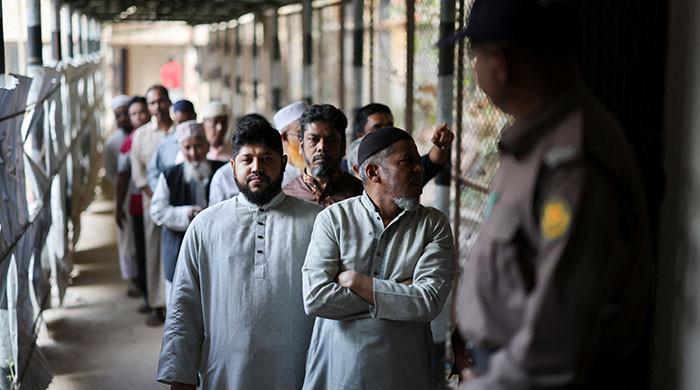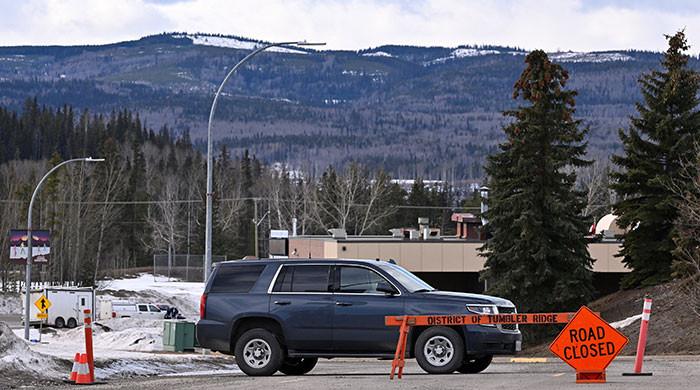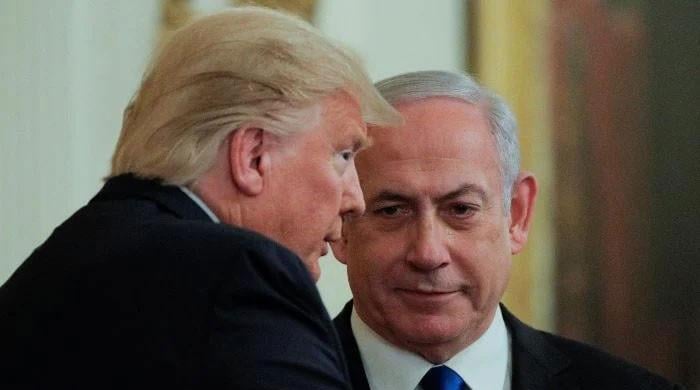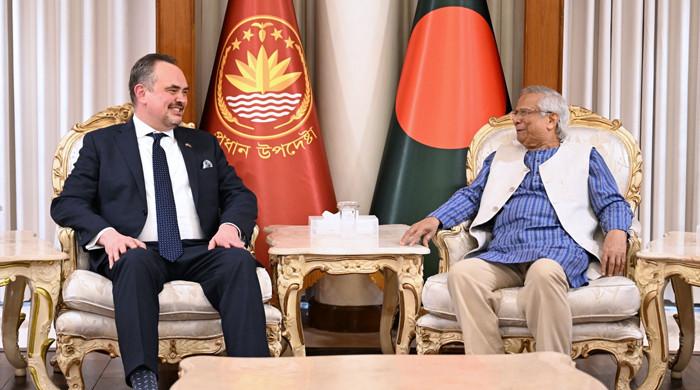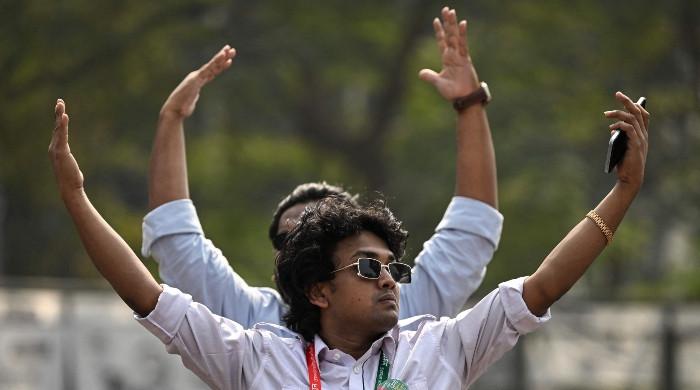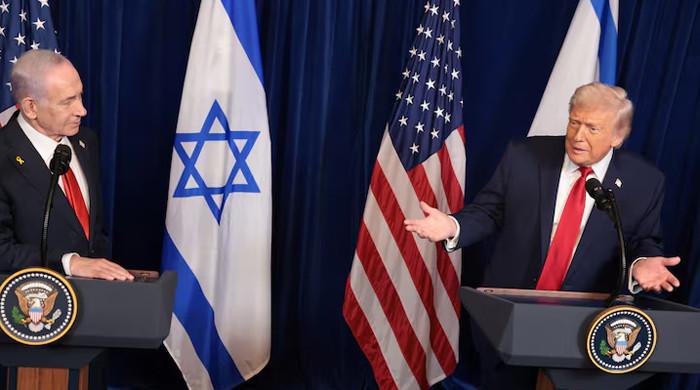Cameron under fire for singling out Muslim women over English learning
Sayeeda Warsi says Cameron has adopted a ‘lazy and misguided’ approach; Muslims groups say Cameron Cameron is demonising British Muslim communities
January 19, 2016
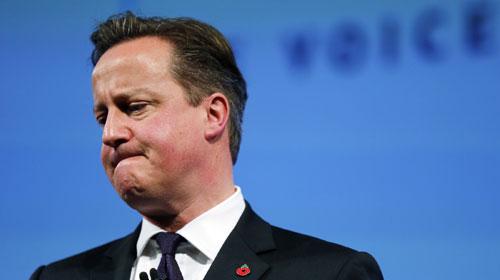
By Murtaza Ali Shah
LONDON: Prime Minister David Cameron has been accused of a "lazy and misguided" approach after warning that Muslim women who fail to improve their English language skills could be deported as part of a drive to build community integration and counter extremism.
The Prime Minister warned that not speaking the language adequately could make people "more susceptible" to the recruitment messages of groups like the self-styled Islamic State (IS) - though there was no "causal link".
Soon after his controversial comments, David Cameron faced a backlash from Muslim groups and former Cabinet minister Baroness Sayeeda Warsi for linking the issue of English language skills to extremism.
The PM said during a visit to Islamic centre in Leeds: "The evidence is that there are some 40,000 women in our country who really don't speak any English at all and, perhaps altogether, some 190,000 with very poor English. I think it's quite right to say to people who come to our country that there are many rights that you have here - it's a fantastic country to live in - but there are also obligations that we should put on people who come to our country, and chief amongst them should be obligations to learn English because then you can integrate, you can take advantage of the opportunities here and you can help us to build the strong country that we want."
Asked about the threat of deportation, Mr Cameron said: "What we've said is that if people come here on a spousal visa, to be a husband or a wife, we've now said they have to learn English in order to get that visa. But after two-and-a-half years, halfway through the programme of getting settlement, they should be improving their English, and if they don't do that then they can't be guaranteed to be able to go to the full stage and retain their visa."
Lady Warsi, the former Tory chairman who was the first female Muslim Cabinet minister, welcomed the new money for language teaching, claiming it had been a mistake to cut funding for English tuition while she was in government.
But she condemned the way the measure had been announced: "This lazy and misguided linking, and what I saw once again as stereotyping of British Muslim communities, I felt took away from what was a positive announcement."
She told BBC Radio 4's World at One: "My parents came to this country with very little English - my mum's English still isn't great, even though she has been to English language classes. They didn't necessarily identify with a Western culture but they absolutely had the right values to bring up five girls, make sure that they were educated and made a contribution to British society.
"So I think it is lazy and sloppy when we start making policies based on stereotypes which do badly stigmatise communities."
She added: "What we should be saying to women is, 'we will give you every opportunity to learn, we will encourage you, support you, that it is a requirement for you to obtain British citizenship'.
"But I think to threaten women and say to them that 'unless you are of X standard we will send you back, even if you have children in the UK who are British and your spouse is British' is, for me, a very unusual way of empowering and emboldening women."
Bradford East MP Imran Hussain said that “rather than offering sensible solutions to problems that affect non-English speakers of all faiths, the Prime Minister has revealed his true discriminatory and divisive nature, and I would also have been more supportive had the announcement not come from a Government who have already gone about slashing ESOL funding through massive cuts and withdrawing ESOL mandated funding which was established to improve English language skills”.
He added: “Whilst the Prime Minister is indeed right to talk about tackling discrimination, empowering women and increasing English language skills, by making utterly outrageous and unsupported claims in the process that allude to a belief that a lack of English language skills can drive Muslim women to radicalisation, he has harmed his own cause and has yet again further stigmatised Muslims, and in doing so has both antagonised and alienated communities. There is absolutely no evidence to support this view and it is extremely damaging behaviour from a Prime Minister. I hope that he now either produces evidence to back up his comments or he immediately withdraws them.”
Shuja Shafi, secretary general of the Muslim Council of Britain, said: "The Prime Minister is absolutely right in wanting English to be taught more widely. Mosques and Muslim civil society would be eager to play their part by hosting English language classes, as many mosques do. But the Prime Minister's aim to have English more widely spoken and for better integration falls at the first hurdle if he is to link it to security and single out Muslim women to illustrate his point."
Shadow home secretary Andy Burnham said: "In his desire to grab easy headlines, David Cameron risks doing more harm than good. His clumsy and simplistic approach to challenging extremism is unfairly stigmatising a whole community. There is a real danger that it could end up driving further radicalisation, rather than tackling it."
Muslim Women’s Council said it didn’t agree with the assertion that there is a link between a lack of English and extremism.
It said: “The ability to converse in the English language should apply to all communities including Eastern Europeans. To single out Muslim women in this manner appears to be a lame attempt by this Government.” Crossbench peer Baroness Afshar said Muslims are being "demonised at every turn" and they are branded "terrorists" because of their faith.
Women arriving in the UK under a spousal visa are currently expected to have English skills at the internationally-recognised A1 beginner level - roughly equivalent to a native-born child starting primary school.
Under the PM's proposal, the women would be expected to have reached the A2 - elementary - level after two-and-a-half years, and B1 - intermediate - after five years.




